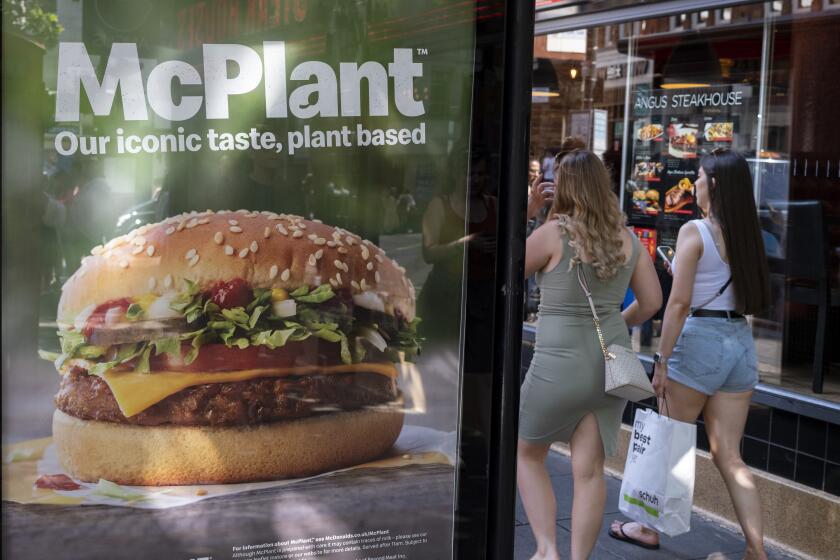Heart in the Rye Place : Langer’s Has Mastered Deli-Cate Art of Survival
Al Langer, whose pungent pastrami on chewy rye is widely considered the best in Los Angeles, knows it takes more than a tasty sandwich to keep a delicatessen afloat for half a century.
In part, it’s a crapshoot, admits the 84-year-old patriarch of Langer’s Deli, which has seen good times and bad in the MacArthur Park neighborhood where he opened shop 50 years ago this month with $500 in his pocket.
But the scrappy New Jerseyite says it’s also a matter of knowing when to hold, what to fold and how to change with the times.
Take the deli’s location. As the once-prosperous commercial and residential Jewish neighborhood became filled with struggling Central American refugees, Langer held on, convinced that there would always be customers for his matzo brei, kippers and those fat, famous sandwiches.
Maybe so, but not at night or on Sundays anymore.
*
Times have changed from the booming days when Langer’s ran three shifts and stayed open until 3 a.m., drawing huge crowds of hungry men after the bars closed.
By 1990, gangs and crack had infested the neighborhood and put a damper on business.
Then four years ago, Al and his son Norm, 52, who now runs the daily operations, took a hard look and realized that 80% to 85% of their business came from lunch: Breakfast trade had dropped off, and many people were afraid to visit the neighborhood once night fell.
They trimmed their costs by eliminating a shift, laying off a few workers, paring back hours from 8 a.m. to 4 p.m. and closing altogether on Sunday. Hiring nonunion workers would have saved even more money, but on this point the Langers stood firm.
“We’re a union shop, always have been,” says Al Langer in a New Jersey accent that has only thickened with the years. “We offer complete medical. If they have 15 kids, they’re all taken care of.”
Employee Alex Barragan says the Langers stuck with him while he licked a drug problem.
“When you need something, they’re here for you, financially, spiritually. That’s why these guys have been here 10, 20, 30 years,” says Barragan, waving to the men and women bustling behind the counter.
The loyalty works both ways. Four years ago, Barragan came to his bosses with an idea: Why not introduce curbside service, in which customers phone or fax in orders and an employee runs out with the food when they drive up.
Curbside service has been a “lifesaver” and now accounts for up to a quarter of the deli’s business, according to Al Langer, who says that illustrates another characteristic of the longtime successful business.
“You’ve got to listen to your employees,” he says.
The Langers are also active in the community. Norm Langer donated six bicycles to the Police Department to help officers patrol MacArthur Park. He sits on the community police advisory board and lobbied successfully for a police substation in the area.
“They’ve been a cornerstone for the community, one of the establishments that’s helped keep it going and healing,” Police Capt. Richard Meraz says.
MacArthur Park itself has also experienced a turnaround. The lake, which was drained for subway construction, has been refilled, and the grass is green and inviting. Violent crime is down 16.7% in the last year, according to the Police Department.
Lady luck must also like pastrami. Back in 1993, when crime and dwindling business had the Langers doubting their future, the Red Line, Los Angeles’ first subway, opened its final westbound stop a block away at 7th and Alvarado, releasing a steady stream of downtown office workers into Langer’s at lunchtime.
The crowd thinned last year after subway fares shot up from 25 cents to $1.35 each way.
“That’s a little strong, on top of the price of lunch,” says Norm Langer, who estimates the price hike has slashed his revenue by 30%. Beyond that, he doesn’t want to discuss numbers.
Indeed, Langer’s has taken its lumps over the years. The restaurant, which always did a big catering business, has been hurt by the corporate exodus from downtown.
But the suit-and-tie crowd keeps coming for lunch, clamoring for the pastrami, more than 2 million pounds of it over the last half century. So does the Koreatown businessman who comes in for a takeout sandwich and side of sauerkraut--which he gleefully refers to as “Jewish kimchee.”
And there is Claude Smith, 69, a regular since 1960.
“I used to be a cook on the railroad, so I know good food, and this is just like being in New York,” he says.
“Langer’s has survived because it has remained loyal to its customers,” says Los Angeles City Councilman Mike Hernandez, who represents the MacArthur Park area and is sponsoring a council resolution honoring the restaurant.
Norm Langer also keeps prices down, and the signature pastrami sandwich, at $7.50, is more than a buck cheaper than, say, the trendy Broadway Deli in Santa Monica, which charges $8.75.
And the deli won’t compromise on the food, which is why critics from the Los Angeles Times to the New York Times consistently refer to its pastrami as the best in the West.
One of Al Langer’s requirements is to cut the pastrami by hand, trimming the fat.
“When I started, there were no machines, so I had to cut by hand,” he recalls. “But it takes manual dexterity. You have to have the feel for it, and it’s a dying art.”
Al Langer learned the art at 12, when his mother got him a deli job in Newark so he could earn $35 to pay for his bar mitzvah. After high school, he worked the deli circuit--New York’s Catskills in the summer, Miami Beach, Fla., by winter, before moving to L.A. in 1937.
Langer opened his own joint in MacArthur Park in 1947 with $500 borrowed from his stepfather and $6,000 in credit from suppliers. His wife, Jean (they’ve been married 56 years), did the books and still comes in twice a week to keep an eye on things. After two expansions, the restaurant now has 137 seats and 4,300 square feet.
And when most delis either closed up or moved west (Canter’s on Fairfax was originally in the then-Jewish neighborhood of Boyle Heights, for instance), Langer stayed put.
“People come back after 30 years, they bring their grandkids and they say with amazement that the prices have changed, but the food, the restaurant--it’s still the same,” Al Langer says with satisfaction.
“Business is OK,” he says and grins. “I still don’t serve bean sprouts.”
More to Read
Eat your way across L.A.
Get our weekly Tasting Notes newsletter for reviews, news and more.
You may occasionally receive promotional content from the Los Angeles Times.

![LOS ANGELES, CA - JUNE 17: [Cody Ma and Misha Sesar share a few dishes from their Persian Restaurant Azizam] on Monday, June 17, 2024 in Los Angeles, CA. (Ethan Benavidez / For The Times)](https://ca-times.brightspotcdn.com/dims4/default/7ffc7f6/2147483647/strip/true/crop/5110x3417+306+0/resize/320x214!/quality/75/?url=https%3A%2F%2Fcalifornia-times-brightspot.s3.amazonaws.com%2F79%2Fdc%2F4d29255545f5b9813315901692bc%2F1459972-fo-azizam-review20-eba.JPG)




